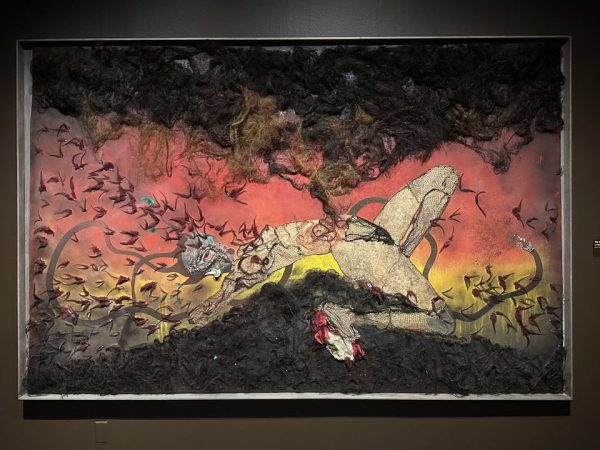Brain Waves: Best friends

December 2, 2015
It really, fully started when I was 17-years-old; I decided that I wanted to eat less. Simple and matter-of-fact, but I was determined. It can be hard for others to comprehend why someone wouldn’t eat anything substantial for days on end or why you would make yourself sick after every bite, but anorexia became my best friend and my best friend became the voice behind my anorexia.
My best friend in high school had an eating disorder before I ever knew her. Though you could see her recovery in photographs — the life that returned to her eyes and the weight that filled her gaunt cheeks — her idea of beauty never changed, even when her body did. Without recognition, I adopted her ideals as my own.
“You can tell she’s bulimic,” she said one night years before I ever dreamt of having an eating disorder. “The way her stomach looked bloated, even though she was kind of slim, I guess. The way you have to do it is just not eat. Ever.”
I’ll never forget that moment — the way the streetlights reflected off the wet asphalt, the way she looked as she stared through the windshield — calm and sure of her beliefs, the way her words felt like knives jamming into both of my sides and how with each breath that filled my lungs, the pain grew stronger and nausea filled my throat at the thought that she must have considered me enormous.
Whenever I would take a bite or merely thought of my appearance, I heard a voice saying that I wasn’t enough, that I was disgusting. On days that I did eat anything, they’d tell me that I couldn’t do anything right, that I couldn’t even have an eating disorder correctly, as if there is a right way.
I yearned to return to the ease of childhood, but even then I never felt beautiful. Somehow, my eating disorder became a treasured, manipulative friend that supported me when it felt like no one did. After over a year of withering away, I finally took an honest look at myself. My skin had turned a paler color than I had ever seen; my veins were now dark flowing rivers within a desert of white sand. My bones jutted out underneath the sand and water, angular mountains of disarray and loneliness. My hands touched my cold skin, feeling the utterly foreign body, and I had the change of heart that would save my life: I had to do everything in my power to recover.
A therapist diagnosed me as an “attention seeker,” so I took it upon myself to recover and took it one step at a time, easing back into whatever normal eating really was. Every time I heard my “eating disorder voice,” as people call it, I took a moment to tell myself that whatever it said wasn’t true and that I was strong; someone could find anything I considered flawed beautiful, and maybe I’d see that one day.
My best friend and I lost touch, which was for the best in the long run. It gave me the time to take a step back and evaluate why I thought emaciation was beautiful and how my life had become this whirlwind of starvation; it gave me the chance to realize the voice in my head telling me that I was nothing had been hers. That said, I can’t place the blame on her because of the way I turned some of her thoughts into my own actions, and I know she never intended to hurt me or affect me.
Recovery was the hardest obstacle I’ve ever experienced. Allowing yourself to succumb to a disorder and addiction like anorexia can surprisingly be so simple, but breaking that addiction and literally fighting against your own mind to recognize what is normal and healthy is something I still struggle with sometimes. At times, I even wish for the heartache and comfort of my eating disorder again, but I look down at my tattoo marking my decision to recover and remember everything that it stands for — happiness, energy, friendship and a possibility of a future.
To anyone that this strikes a chord with, know that you’re not alone, no matter how hard that can be to accept. You don’t have to go through this alone; it’s unbelievably hard and unnecessary, and more people than you can imagine have had the same thoughts and experiences. Know that your feelings are valid — the ones of confusion, fright and, hopefully, acceptance and certainty — but also know that the voice in your head telling you that you can’t amount to anything isn’t true in the slightest. Push those thoughts and that voice away, and it may sound cliché but remember you are strong and loved. At times I thought recovery would mean I was weak or that my eating disorder wasn’t “bad enough,” but recovery means life. I believe in you no matter what you are dealing with, and I can tell you from experience that life can be so much more than starvation and purging and anxiety over every morsel of food. Believe that you’re strong, and believe in your ability to live.





















Leave a Comment